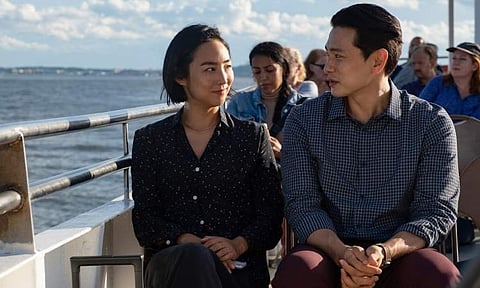

The tug of Past Lives is situated in the many moments that come together to shape the film into a meaningful whole about love—lost and found, abandoned and claimed. A snatch of a conversation or just an exchange of eloquent glances that linger on. Celine Song’s elegant debut uses both vivid words as well as poignant silences to talk about the universal human condition, the lack of inner fulfilment, and the eternal quest for a completion of sorts through the significant other.
It is a delicate character study of individuals amid a skein of intricate relationships. The film talks about three people who are defined by their relationship with each other as much as they are defined by their distinct personalities. It’s as though they are on a journey together, changing in each other’s company and, at times, also in the lack of it.
Na Young/Nora (Greta Lee) is the kind who’d always be in the driver’s seat. Living in the moment, she is someone who lets go of the past with ease. She wants to do everything and wants everything. Pulitzer, Tony—the aims and achievements are always pitched high.
Hae Sung (Teo Yoo) the childhood buddy she left behind in South Korea before immigrating to Canada and her Jewish partner Arthur (John Magaro) are both swayed by her. One has kept a part of his life on hold for her while the other feels like an outsider despite sharing his life with her. Even as she makes his world bigger, he despairs not knowing the language she dreams in. After twenty-four years, the tables appear to have turned. It’s they who seem to have found a resolve within. As the past enters the present, Nora is left vulnerable in ways she wouldn’t have imagined.
Song crafts Past Lives like the crescendo in a classical symphony. The musical set-piece has philosophical underpinnings about the many truths of life. Beyond the tale of separation, thwarted togetherness and unrequited love, there is a mature exploration of the consequences of our choices. As the film itself states, it’s when you leave—people, places, relationships, objects—that you also gain more of them. The film charts an entirely new course for the “immigrant” narrative in cinema, distilling it to the personal and the individual. The family, country, community, culture, and language stay in the background, providing a context to and shaping the lives of the three people. However, the film itself stays focused on the characters.
One feels equally about the predicaments of the three and it’s tough to imagine any actors own these characters the way Lee, Yoo and Magaro do. Having said that, Yoo uses his amazingly expressive eyes to beautiful effect in the long conversation at the bar towards the end as he haltingly talks about how he always loved Nora/Na Young for who she was, a girl who was always leaving [him] behind, and how hurt he felt seeing her with Arthur, the person she had decided to stay with.
Knitting it all together is the fascinating Korean philosophy of In-Yun, i.e. fate or providence. If you meet someone, even for a brief while, it’s an indication that you had also met them in the past. Couples in this life have layers of in-yun between them, they’d have met repeatedly in their past lives to get to have a present together. Will Nora and Hae Sung have a connection in the future? Or will their paths stay forked as they have in the present? Past Lives is a beautiful rumination on the remnants of the past, a complex chronicle of love, loss and longing.